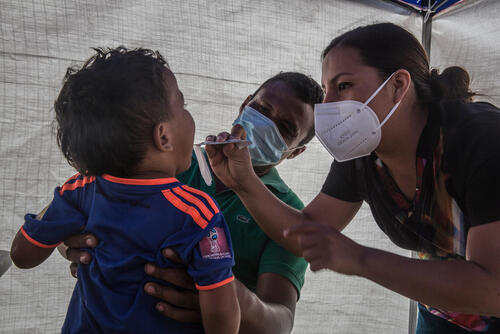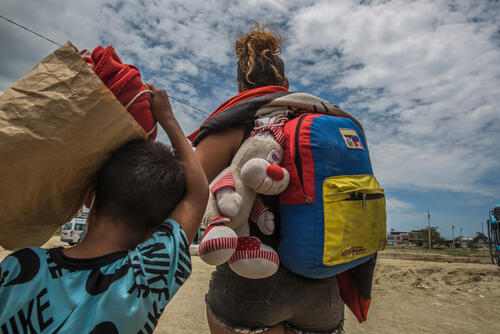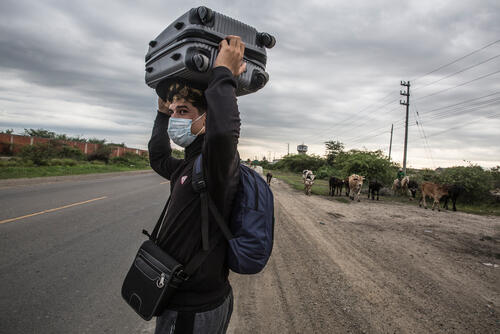After an arduous journey, healthcare is still out of reach for Venezuelan migrants.
Thousands of people enter Peru each week after undertaking a 3,000-kilometre journey from their homes in Venezuela.
Many are young families, walking and traveling by bus or truck, carrying their belongings in backpacks. It is a continuation of one of the largest migration crises in the world. Political tensions and economic hardships have caused more than six million people to leave their homes in Venezuela in recent years.
Most travel to other countries in South America, such as Colombia, Peru or Chile. In late 2021, MSF began running health posts for migrants traveling through the northern border region of Tumbes and in areas of the capital, Lima, which is the main destination for Venezuelan migrants in Peru.
"We see families that arrive with small children, under five years old, who are malnourished and anaemic," says Omaira Salas, a physician at MSF's health post in Lima. "We also see pregnant women who need birth control but have not had it, or who have not had a sonogram or any prenatal care."

We see families that arrive with small children, under five years old, who are malnourished and anaemic.Omaira Salas, physician at MSF's health post in Lima
MSF responding to needs of migrants
Four days a week, our staff see patients near a bus terminal in Lima's Fiori neighbourhood, where many migrants arrive in the city. Migrants have a broad array of health needs, including for primary healthcare, sexual and reproductive healthcare, mental health care, emergency referrals to hospitals and treatment for chronic diseases.
"As a doctor, what worries me is the number of patients who arrive with chronic diseases such as hypertension and diabetes," Salas says. "They have run out of their medication and do not have the means to purchase more."
In Tumbes and in Lima, our staff provide initial medical consultations and basic treatment that migrants have not been able to access before or during their journey, such as iron supplements for children who are anemic, or folic acid for pregnant women.
Our teams also help patients to register for services in the Peruvian health system, which can be very difficult for migrants to access. All pregnant women and children under five are entitled to free public healthcare in Peru, yet health workers still require documents that migrants do not have, such as a proof of residence.

"If a woman is in labor, a health centre will take her if she has documents, but if she doesn't have documents, they will not take her, unless it is an emergency," says Yohana Arevalo-Polack, MSF health promotion supervisor in Tumbes.
COVID-19 and tough conditions add to hardships
The COVID-19 pandemic has increased the hardships that migrants face. Peru officially closed its borders in March 2020 and has only recently reopened them. While Venezuelan migrants could previously register upon arrival and apply for a humanitarian visa, they can no longer do so, making it more difficult to obtain employment or register for essential services.
Crossing the border from Ecuador typically takes more than four hours on foot, in hot conditions.
Many people arrive in Peru exhausted and dehydrated. In addition to basic medical care, our staff in Tumbes provide food and water, COVID-19 vaccinations, psychological first aid and a phone number for MSF's clinic in Lima. A social worker helps identify other social services that may be available, both in Tumbes and in Lima.
Many do not stay long in Tumbes, working informally by washing cars or doing other tasks, to earn money for a bus ride to the capital city or beyond. Others walk or hitch rides on passing trucks, sometimes by climbing on the back. In Tumbes, our staff have found that migrants have repeatedly been injured in accidental falls from moving vehicles.

Migrants continue to be targets of violence
Violence against migrants is all too common, especially in border areas. Multiple people have reported to MSF that they were threatened and robbed by groups of armed men near the border between Ecuador and Peru. A 50-year-old woman travelling with her sons aged 24 and 25 gave the following account:
She stated she had just been robbed, after having taken a motorcycle taxi very close to the border with Ecuador, in Peruvian territory. The motorcycle taxi took approximately 30 minutes to reach an unknown destination, where they were ambushed by a group of three people. They threatened to take the life of her younger son and took all their belongings. They were told that if they denounced the robbers, their complaint would not move forward because theft is customary in this zone.
In Tumbes, our staff are sometimes the first to greet migrants as they cross and offer psychological first aid, among other support. "We have seen much frustration, much anxiety, because they come with such hopes, and the first thing they experience is robbery or other types of violence," Arevalo-Polack says.



